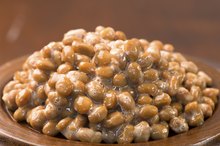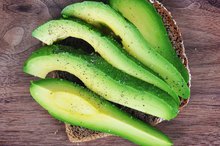Is Too Much Vitamin K Bad for Those With High Blood Pressure?
It seems to make perfect sense that too much vitamin K may not be the best thing for your blood pressure control. Your suspicions may further be validated by the wide use of anti-coagulant prescriptions to prevent strokes, heart attacks or embolisms. According to the American Heart Association, an anti-coagulant may prevent your blood from clotting or existing clots from getting larger; by doing so, the drug inhibits vitamin K. However, if you only have high blood pressure, vitamin K is not going to worsen blood flow and may even help.
Know More About Vitamin K
Vitamin K is well known for its role in the body's blood-clotting process. In rare situations when vitamin K is extremely low in the blood, uncontrollable bleeding may result when injury occurs, as with hemophiliacs. You can take in excessive vitamin K if you use supplements, but any adverse effects of this are unknown. If you are considering vitamin K supplementation or limiting the vitamin in your diet, consult a registered dietitian or physician before doing so.
- Vitamin K is well known for its role in the body's blood-clotting process.
- You can take in excessive vitamin K if you use supplements, but any adverse effects of this are unknown.
Vitamin K and Blood Pressure
Are Fish Oils the Same As Vitamin E?
Learn More
In a study published in the journal “Kidney and Blood Pressure Research” in 2010, researchers from the Ehime University Graduate School of Medicine in Japan found that low vitamin K may be associated with increased hardening of the arteries. This causes the heart to work harder to pump blood to the rest of the body, which may contribute to high blood pressure and increase the risk for cardiovascular disease.
Where to Find Vitamin K
Although there is not enough research available to officially claim any heart health benefits, it is usually safe to follow a diet high in fruits and vegetables. Vitamin K is naturally most abundant in green leafy vegetables such as collard greens, broccoli and spinach and is also made by gut bacteria in the body. It is highly uncommon for individuals to be deficient in vitamin K, and there is no definition of what too much vitamin K is.
Beware of False Claims
Does Vitamin C Affect Coumadin?
Learn More
Some websites state that Vitamin K is the same thing as the mineral potassium. In the medical field, potassium is commonly abbreviated as K+; it is an element in the periodic table abundantly found in fruits and vegetables, has different functions in the body than that of vitamin K and is absolutely not the same as vitamin K.
Related Articles
References
- American Heart Association: What Are Coagulants and Antiplatelet Agents?
- “Kidney & Blood Pressure Research”; Undercarboxylated Osteocalcin Is a Biomarker of Carotid Calcification in Patients With Essential Hypertension; T. Okura, et al.; March 2010
- Holick MF, Gordon CM. Patient Guide to Vitamin D Deficiency. The Journal of Clinical Endocrinology & Metabolism. 2011;96(7):1-2. doi:10.1210/jcem.96.7.zeg33a
- Sunyecz JA. The use of calcium and vitamin D in the management of osteoporosis. Ther Clin Risk Manag. 2008;4(4):827-836. doi:10.2147/tcrm.s3552
- Giovannucci E, Liu Y, Hollis BW, Rimm EB. 25-hydroxyvitamin D and risk of myocardial infarction in men: a prospective study. Arch Intern Med. 2008;168(11):1174-1180. doi:10.1001/archinte.168.11.1174
- Gorham ED, Garland CF, Garland FC, et al. Optimal vitamin D status for colorectal cancer prevention: a quantitative meta analysis. Am J Prev Med. 2007;32(3):210-216. doi:10.1016/j.amepre.2006.11.004
- Lappe JM, Travers-Gustafson D, Davies KM, Recker RR, Heaney RP. Vitamin D and calcium supplementation reduces cancer risk: results of a randomized trial. The American Journal of Clinical Nutrition. 2007;85(6):1586-1591. doi:10.1093/ajcn/85.6.1586
- Prentice RL, Pettinger MB, Jackson RD, et al. Health risks and benefits from calcium and vitamin D supplementation: Women’s Health Initiative clinical trial and cohort study. Osteoporos Int. 2013;24(2):567-580. doi:10.1007/s00198-012-2224-2
- Urashima M, Segawa T, Okazaki M, Kurihara M, Wada Y, Ida H. Randomized trial of vitamin D supplementation to prevent seasonal influenza A in schoolchildren. Am J Clin Nutr. 2010;91(5):1255-1260. doi:10.3945/ajcn.2009.29094
- Salehpour A, Hosseinpanah F, Shidfar F, et al. A 12-week double-blind randomized clinical trial of vitamin D₃ supplementation on body fat mass in healthy overweight and obese women. Nutr J. 2012;11:78. doi:10.1186/1475-2891-11-78
- Carrillo AE, Flynn MG, Pinkston C, et al. Impact of vitamin D supplementation during a resistance training intervention on body composition, muscle function, and glucose tolerance in overweight and obese adults. Clin Nutr. 2013;32(3):375-381. doi:10.1016/j.clnu.2012.08.014
- Marcinowska-Suchowierska E, Kupisz-Urbańska M, Łukaszkiewicz J, Płudowski P, Jones G. Vitamin D Toxicity-A Clinical Perspective. Front Endocrinol. 2018;9:550. doi:10.3389/fendo.2018.00550
- Ross AC, Manson JE, Abrams SA, et al. The 2011 report on dietary reference intakes for calcium and vitamin D from the Institute of Medicine: what clinicians need to know. J Clin Endocrinol Metab. 2011;96(1):53-58. doi:10.1210/jc.2010-2704
- Bouillon R, Van Schoor NM, Gielen E, et al. Optimal vitamin D status: a critical analysis on the basis of evidence-based medicine. J Clin Endocrinol Metab. 2013;98(8):E1283-E1304. doi:10.1210/jc.2013-1195
- American Academy of Dermatology. Position Statement of Vitamin D. 2010.
- Taksler GB, Cutler DM, Giovannucci E, Keating NL. Vitamin D deficiency in minority populations. Public Health Nutr. 2015;18(3):379-391. doi:10.1017/S1368980014000457
- Holick MF, Binkley NC, Bischoff-Ferrari HA, et al. Evaluation, treatment, and prevention of vitamin D deficiency: an Endocrine Society clinical practice guideline. J Clin Endocrinol Metab. 2011;96(7):1911-1930. doi:10.1210/jc.2011-0385
- Cannell JJ, Vieth R, Umhau JC, et al. Epidemic Influenza and Vitamin D. Epidemiol Infect. 2006; 134:1129-40.
- Carrillo AE1, Flynn MG, Pinkston C, Markofski MM, Jiang Y, Donkin SS, Teegarden D. Impact of Vitamin D Supplementation During a Resistance Training Intervention on Body Composition, Muscle Function, and Glucose Tolerance in Overweight and Obese Adults. Clin Nutr. 2013 Jun;32(3):375-81. doi: 10.1016/j.clnu.2012.08.014. Epub 2012 Aug 31.
- Ginde AA, Mansbach JM, Camargo CA, Jr. Association Between Serum 25-Hydroxyvitamin D Level and Upper Respiratory Tract Infection in the Third National Health and Nutrition Examination Survey. Arch Intern Med. 2009; 169:384-90.
- Giovannucci E, Liu Y, Hollis BW, Rimm EB. 25-hydroxyvitamin D and Risk of Myocardial Infarction in Men: a Prospective Study. Arch Intern Med. 2008; 168:1174-80.
- Gorham ED, Garland CF, Garland FC, Grant WB, Mohr SB, Lipkin M, Newmark HL, Giovannucci E, Wei M, Holick MF. Optimal Vitamin D Status for Colorectal Cancer Prevention: a Quantitative Meta-analysis. Am J Prev Med. 2007 Mar;32(3):210-6.
- Heaney, Robert P. “The Vitamin D Requirement in Health and Disease.” The Journal of Steroid Biochemistry & Molecular Biology 97 (2005):13-9.
- Holick MF. Vitamin D. In: Shils M, Olson J, Shike M, Ross AC, ed. Modern Nutrition in Health and Disease, 9th ed. Baltimore: Williams and Wilkins, 1999.
- National Institutes of Health Office of Dietary Supplements. Vitamin D: Dietary Supplement Fact Sheet. University of Ottawa Evidence-based Practice Center. Effectiveness and Safety of Vitamin D in Relation to Bone Health. Agency for Healthcare Research and Quality. Aug 2007: 07-E013.
- Salehpour A1, Hosseinpanah F, Shidfar F, Vafa M, Razaghi M, Dehghani S, Hoshiarrad A, Gohari M. A 12-week Double-blind Randomized Clinical Trial of Vitamin D₃ Supplementation on Body Fat Mass in Healthy Overweight and Obese Women. Nutr J. 2012 Sep 22;11:78. doi: 10.1186/1475-2891-11-78.
- Urashima M, Segawa T, Okazaki M, Kurihara M, Wada Y, Ida H. Randomized Trial of Vitamin D Supplementation to Prevent Seasonal Influenza A in Schoolchildren. Am J Clin Nutr. 2010 91:1255-60. Epub 2010 Mar 10.
- Wilkins, Consuelo H. and Yvette I. Sheline, et al. “Vitamin D Deficiency Is Associated with Low Mood and Worse Cognitive Performance in Older Adults.” American Journal of Geriatric Psychiatry 14 (2006): 1032-40.
Writer Bio
Jennifer Lemacks is an assistant professor at the University of Southern Mississippi with a doctorate in human nutrition from Florida State University, and is a registered dietitian trained in child and adolescent weight management. She has prepared, edited and presented various manuscripts for peer-reviewed journals and professional conferences.








